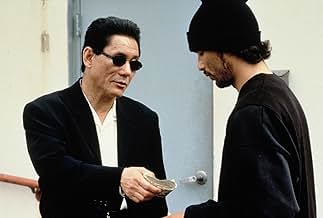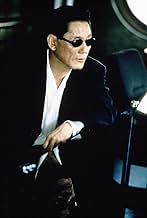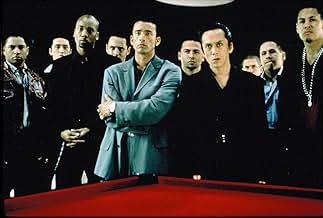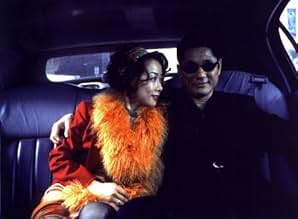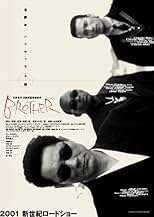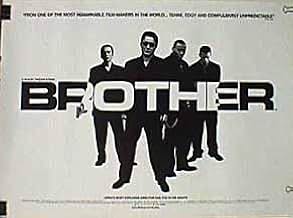NOTE IMDb
7,1/10
25 k
MA NOTE
En rupture avec son gang, Yamamoto s'exile à L.A., USA. Il y retrouve un frère américanisé, dealer à la petite semaine dans une bande. Le Yakusa constate qu' un 'milieu' aussi minable est bo... Tout lireEn rupture avec son gang, Yamamoto s'exile à L.A., USA. Il y retrouve un frère américanisé, dealer à la petite semaine dans une bande. Le Yakusa constate qu' un 'milieu' aussi minable est bon à ramasser. Il convertit vite fait ces voyous au Made in Japan. [255]En rupture avec son gang, Yamamoto s'exile à L.A., USA. Il y retrouve un frère américanisé, dealer à la petite semaine dans une bande. Le Yakusa constate qu' un 'milieu' aussi minable est bon à ramasser. Il convertit vite fait ces voyous au Made in Japan. [255]
- Récompenses
- 1 victoire et 1 nomination au total
Takeshi Kitano
- Aniki Yamamoto
- (as 'Beat' Takeshi)
Tatyana Ali
- Latifa
- (as Tatyana M. Ali)
Histoire
Le saviez-vous
- AnecdotesThis was Takeshi Kitano's only American film he ever made. In an interview, Kitano said that he did not like the final result of Brother and that he regretted his "Hollywood adventure", which was supposed to bring him a wider audience. As a result, Kitano said that he had no intention of filming outside Japan again.
- Versions alternativesUS version was heavily cut for violence to be in accordance with MPAA demands for a "R" rating.
Commentaire à la une
Takeshi Kitano's Brother is Kitano's masterpiece among his other films. I really haven't seen bad film from him. Brother is set in America as Kitano's character travels to US from Japan, and starts new life there. He has his half brother living there so he has a place to live in. Soon he starts to have new friends and become a leader and member of their new gang/yakuza. Violent confrontations with other gangs and mafia take place as everyone is willing to use violence and vengeance in order to settle things.
Brother has all the usual and breath taking Kitano elements we've learnt to see. The flashbacks of events, long shots without editing, character's faces that say more things than 100 words, images of beauty and peace and wry humor, among others elements. The main theme in Brother is loyalty and friendship that becomes even love. The last scene is fantastic and very unusual for Kitano; never has he underlined his message this clearly as he does in Brother's finale. It is so purifying scene and really makes the point clear, but still, most people don't understand anything about Kitano's films, because they are so personal and different compared to Western mainstream films.
Brother is like a combination of Violent Cop and Hana'Bi. It has Violent Cop's bleakness and Hana-Bi's beauty and sadness. Brother is very sad film at times, and only last scene gives something really positive and also optimistic. Hana-Bi is very sad and beautiful film, and these two, Brother and Hana-Bi, have much in common. Both were composed by the same guy, Joe Hisaishi, who did fantastic job especially in Hana-Bi and also Sonatine. Violent Cop is very gritty and also pessimistic film, and is very similar to Brother in its overall look of life. Both films are also very calm and restrained and not as visually stunning as Hana-Bi and Sonatine. All these films are masterpieces of Japanese cinema, and it is interesting to see how Kitano mixes elements from his other films and creates always something new and immortal.
The violence is very brutal and challenging but definitely not gratuitous or exploitative. Kitano's violence is always very symbolic and sudden, and not necessarily realistic. These films analyze many aspects of violence as a tool of communicating for weak souls. Kitano definitely doesn't justify violence or praise it; he just shows what most people or film makers probably wouldn't even dare to think of, and once the viewer may be thinking "yeah, kill that b****rd!" the film turns against the viewer and makes him think what he just said and accepted. The more emotionally challenging film is, the more noteworthy it becomes and Kitano's films are perfect examples of that.
Brother is also occasionally filled with Kitano's wry and personal humor which was at its taunting in his Boiling Point. Brother has many great personal touches of its creator and every time Kitano's character laughs here, there is something very twisted in his mind and going on. Brother is not thoroughly cynical film after all, and these humoristic touches only add to the great purification of the last scene.
The film criticizes yakuza also pretty much and with the director's personal style, as there are numerous scenes involving yakuza rites and codes of honor. Also, there is a great scene involving basketball and yakuza member's attempt to get the ball and be king of the game and have a feeling of being somebody. Boiling Point has plenty of these scenes and tones as the gangsters play tough guy with big guns and thus try to get acceptance. These films really should make yakuzas ask themselves, why?
I am totally stunned by cinematic styles Kitano uses in his films. The editing and photography is so incredibly smooth and stylish, and creates the atmosphere of the film. The faces are among the most important details in Kitano's films as there are so many things to be read from characters' faces. For example, there is awesome scene in Brother's beginning where Kitano "sees" the death of a yakuza boss. Kitano has totally unique sense of beauty, sensitivity and expressing emotions that has no comparison from other films. His character doesn't talk too much in his films, but anytime he says something, he says and expresses more than thousand words. His films are immortal and can be seen over and over again, and still they have plenty of things to offer for the lover of this unique cinema.
Brother is among Kitano's greatest films and I definitely give this ten out of ten, because there are absolutely no negative aspects in this film, and this proudly stands in Takeshi Kitano's filmography.
Brother has all the usual and breath taking Kitano elements we've learnt to see. The flashbacks of events, long shots without editing, character's faces that say more things than 100 words, images of beauty and peace and wry humor, among others elements. The main theme in Brother is loyalty and friendship that becomes even love. The last scene is fantastic and very unusual for Kitano; never has he underlined his message this clearly as he does in Brother's finale. It is so purifying scene and really makes the point clear, but still, most people don't understand anything about Kitano's films, because they are so personal and different compared to Western mainstream films.
Brother is like a combination of Violent Cop and Hana'Bi. It has Violent Cop's bleakness and Hana-Bi's beauty and sadness. Brother is very sad film at times, and only last scene gives something really positive and also optimistic. Hana-Bi is very sad and beautiful film, and these two, Brother and Hana-Bi, have much in common. Both were composed by the same guy, Joe Hisaishi, who did fantastic job especially in Hana-Bi and also Sonatine. Violent Cop is very gritty and also pessimistic film, and is very similar to Brother in its overall look of life. Both films are also very calm and restrained and not as visually stunning as Hana-Bi and Sonatine. All these films are masterpieces of Japanese cinema, and it is interesting to see how Kitano mixes elements from his other films and creates always something new and immortal.
The violence is very brutal and challenging but definitely not gratuitous or exploitative. Kitano's violence is always very symbolic and sudden, and not necessarily realistic. These films analyze many aspects of violence as a tool of communicating for weak souls. Kitano definitely doesn't justify violence or praise it; he just shows what most people or film makers probably wouldn't even dare to think of, and once the viewer may be thinking "yeah, kill that b****rd!" the film turns against the viewer and makes him think what he just said and accepted. The more emotionally challenging film is, the more noteworthy it becomes and Kitano's films are perfect examples of that.
Brother is also occasionally filled with Kitano's wry and personal humor which was at its taunting in his Boiling Point. Brother has many great personal touches of its creator and every time Kitano's character laughs here, there is something very twisted in his mind and going on. Brother is not thoroughly cynical film after all, and these humoristic touches only add to the great purification of the last scene.
The film criticizes yakuza also pretty much and with the director's personal style, as there are numerous scenes involving yakuza rites and codes of honor. Also, there is a great scene involving basketball and yakuza member's attempt to get the ball and be king of the game and have a feeling of being somebody. Boiling Point has plenty of these scenes and tones as the gangsters play tough guy with big guns and thus try to get acceptance. These films really should make yakuzas ask themselves, why?
I am totally stunned by cinematic styles Kitano uses in his films. The editing and photography is so incredibly smooth and stylish, and creates the atmosphere of the film. The faces are among the most important details in Kitano's films as there are so many things to be read from characters' faces. For example, there is awesome scene in Brother's beginning where Kitano "sees" the death of a yakuza boss. Kitano has totally unique sense of beauty, sensitivity and expressing emotions that has no comparison from other films. His character doesn't talk too much in his films, but anytime he says something, he says and expresses more than thousand words. His films are immortal and can be seen over and over again, and still they have plenty of things to offer for the lover of this unique cinema.
Brother is among Kitano's greatest films and I definitely give this ten out of ten, because there are absolutely no negative aspects in this film, and this proudly stands in Takeshi Kitano's filmography.
Meilleurs choix
Connectez-vous pour évaluer et suivre la liste de favoris afin de recevoir des recommandations personnalisées
Détails
Box-office
- Budget
- 10 000 000 $US (estimé)
- Montant brut aux États-Unis et au Canada
- 450 594 $US
- Week-end de sortie aux États-Unis et au Canada
- 60 029 $US
- 22 juil. 2001
- Montant brut mondial
- 15 250 594 $US
- Durée1 heure 54 minutes
- Couleur
- Mixage
- Rapport de forme
- 1.85 : 1
Contribuer à cette page
Suggérer une modification ou ajouter du contenu manquant

Lacune principale
By what name was Aniki, mon frère (2000) officially released in India in English?
Répondre

